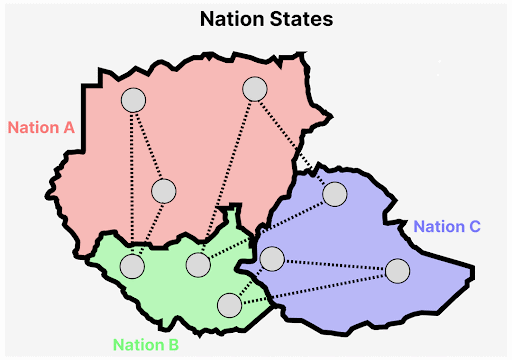The Network State in One Sentence
Listen to this chapter
In one sentence:
If Bitcoin is a decentralized currency, a network state is a decentralized country.
That’s memorable. But what does it mean? Here’s a longer definition, also in one sentence:
A network state is a highly aligned online community with a capacity for collective action that crowdfunds territory around the world and eventually gains diplomatic recognition from pre-existing states.
You’ll notice that the definition of a network state is premised on the existence of the Internet. Because the natural partition of the world now begins with online communities rather than offline territories.
That is, the existing nation state system starts with the map of the earth and assigns each patch of land to a single state. By contrast, the network state system starts with the billions of humans in the cloud and attracts each mind to one or more networks. So, when we think of a nation state, we immediately think of the lands, but when we think of a network state, we should instantly think of the minds.

You can instantly understand this from the animation above. It toggles between an earth-based and cloud-based view of the world, just as you do. For example, if you live in an apartment complex, do you know the people who live 10 feet above you…or are you more familiar with a friend 3000 miles away? Fundamentally: is your true neighbor the geographically-adjacent citizen whose face you don’t even recognize, or the cognitively-adjacent netizen whose profile you see online every day?
This is the sense in which the Internet has disrupted human geography. People are digitally near each other even when physically far away, and vice versa. We can think of the Internet as a parallel Earth, where people have been completely reshuffled relative to where they are on the original Earth, and where they’re figuring out new borders as a consequence. Furthermore, the Internet doesn’t just challenge the geographical assumptions that underpin the nation state; it challenges everything else about it, from citizenship and culture to governance and defense.

That in turn brings us to our third one-sentence summary of the network state, a complex definition that pre-emptively covers many edge cases:
A network state is a social network with a moral innovation, a sense of national consciousness, a recognized founder, a capacity for collective action, an in-person level of civility, an integrated cryptocurrency, a digital passport, a consensual government limited by a social smart contract, an archipelago of crowdfunded physical territories, a virtual capital, and an on-chain census that proves a large enough population, income, and real-estate footprint to attain a measure of diplomatic recognition.
OK, that’s a mouthful! Each clause there is doing work, and if you want to skip ahead, we expand on each part of the definition here. But in short, the definition has many clauses because there are (a) many adjacent forms that satisfy some but not all of the network state criteria and (b) many intermediate stages en route to creating a diplomatically recognized network state.
That’s what we discuss next.
Next Section:
The Network State in One Thousand Words
